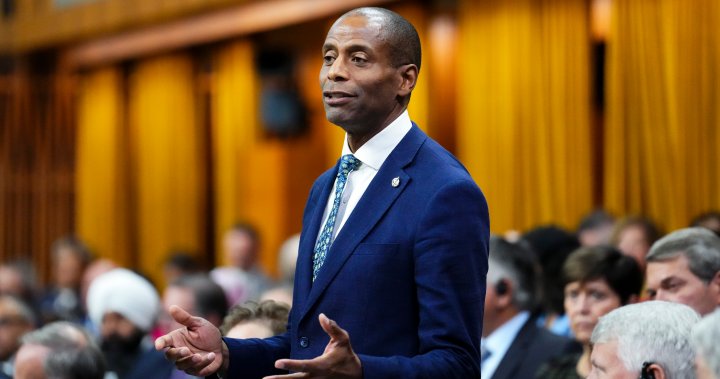Liberal MP Greg Fergus replaced Anthony Rota as Speaker of the House of Commons Tuesday, making history as the first Black Canadian to hold the role.
Fergus, who represents the National Capital Region Quebec riding of Hull—Aylmer, was one of seven candidates vying for the job after Rota resigned from it last week amid international controversy over his actions during a recent visit by Ukraine’s president.
“Today, you are the first Black Canadian to become Speaker of this House,” Prime Minister Justin Trudeau said after the election.
“This should be inspiring for all Canadians.”

NDP Leader Jagmeet Singh called Fergus’s election an “incredible feat.”
“There’s going to be kids who are going to come here and maybe not see themselves represented on the walls,” he said.
“That’s going to change now.”
Fergus’s election follows a day of pitches from the other MPs seeking the role: Liberal MP Sean Casey kicked off the speeches saying there needs to be a reset in the House when it comes to decorum, while Liberal MP Alexandra Mendes said more than anything, civility is needed.

Nova Scotia Conservative MP Chris d’Entremont, who was most recently a deputy Speaker, said it’s important for him to protect the right of MPs to speak in the House, and that his calm French-Canadian demeanour is right for the job.
Fergus said every MP in the chamber has more in common than they care to admit and that he would lead firmly, thoughtfully and collaboratively.
Green Party Leader Elizabeth May, who delivered her speech virtually due to health issues, said she was running so that she could make her concerns known: that the next Speaker must follow the rules.
Liberal MP Peter Schiefke had promised if elected that he would create a policy around due diligence for guests of the Speaker in the House of Commons. He also said he would apologize to his counterpart in Ukraine for the issue that led to his predecessor’s resignation.

Two assistant deputy Speakers — the NDP’s Carol Hughes, from Ontario, and Liberal Alexandra Mendes from Quebec — also sought the position.
Liberal MP Stephane Lauzon withdrew from the election just before speeches got underway.
Trudeau and Singh were in attendance during the speeches, but Conservative Leader Pierre Poilievre was absent, as was Bloc Québécois Leader Yves-François Blanchet.
Following speeches, candidates mingled with other MPs from all sides, appearing to vie for their support as an anonymous ranked ballot voting process got underway.

MPs ranked their candidate in order of their preference, but it was not necessary to rank all seven candidates.
Rota stepped down from the role a week ago amid international controversy over his actions during a recent visit by Ukraine’s president.
Rota invited a veteran who served in a Nazi unit in the Second World War to the House of Commons chamber, and asked parliamentarians and dignitaries to applaud the man as a hero.

Tuesday’s election is considered rare because it’s happening mid-sitting rather than right after an election.
What does the Speaker do?
Once an MP is chosen Speaker, they remain an MP but are considered an independent officer of Parliament.
According to Parliament’s website, the Speaker never participates in debate, only votes in case of a tie and works to balance the right of the government to transact business in an orderly manner and the rights of all MPs as laid out in House of Commons rules.
The Speaker also has other duties, including maintaining decorum in the chamber.

They are the head of the House of Commons administration employees and are responsible for its overall direction and management.
The Parliament of Canada Act indicates all matters of administrative and financial policy affecting the House and its members are overseen by the powerful Board of Internal Economy, composed of MPs and chaired by the Speaker, Parliament’s website states.
The Speaker’s administrative duties also involve tabling certain documents and reports, including those coming from the Board of Internal Economy, bylaws stemming from the provisions of the Parliament of Canada Act and documents submitted by officials like commissioners, the auditor general and the chief electoral officer.

As a representative of the House of Commons, the Speaker has several traditional, ceremonial and diplomatic duties. The Speaker is the spokesperson for the House in its dealings with the Senate, the Crown and other bodies outside Parliament.
They are assisted by a deputy Speaker, who is also chair of any committees of the whole — when the entire House sits as a committee, often for speedier passage of bills or for special debates.
Other presiding officers who carry out the duties of the Speaker when they can’t be in the House of Commons include the deputy chair of committees of the whole and an assistant deputy chair.
— with files from The Canadian Press

© 2023 Motorcycle accident toronto today, Toronto Car Accident News.



